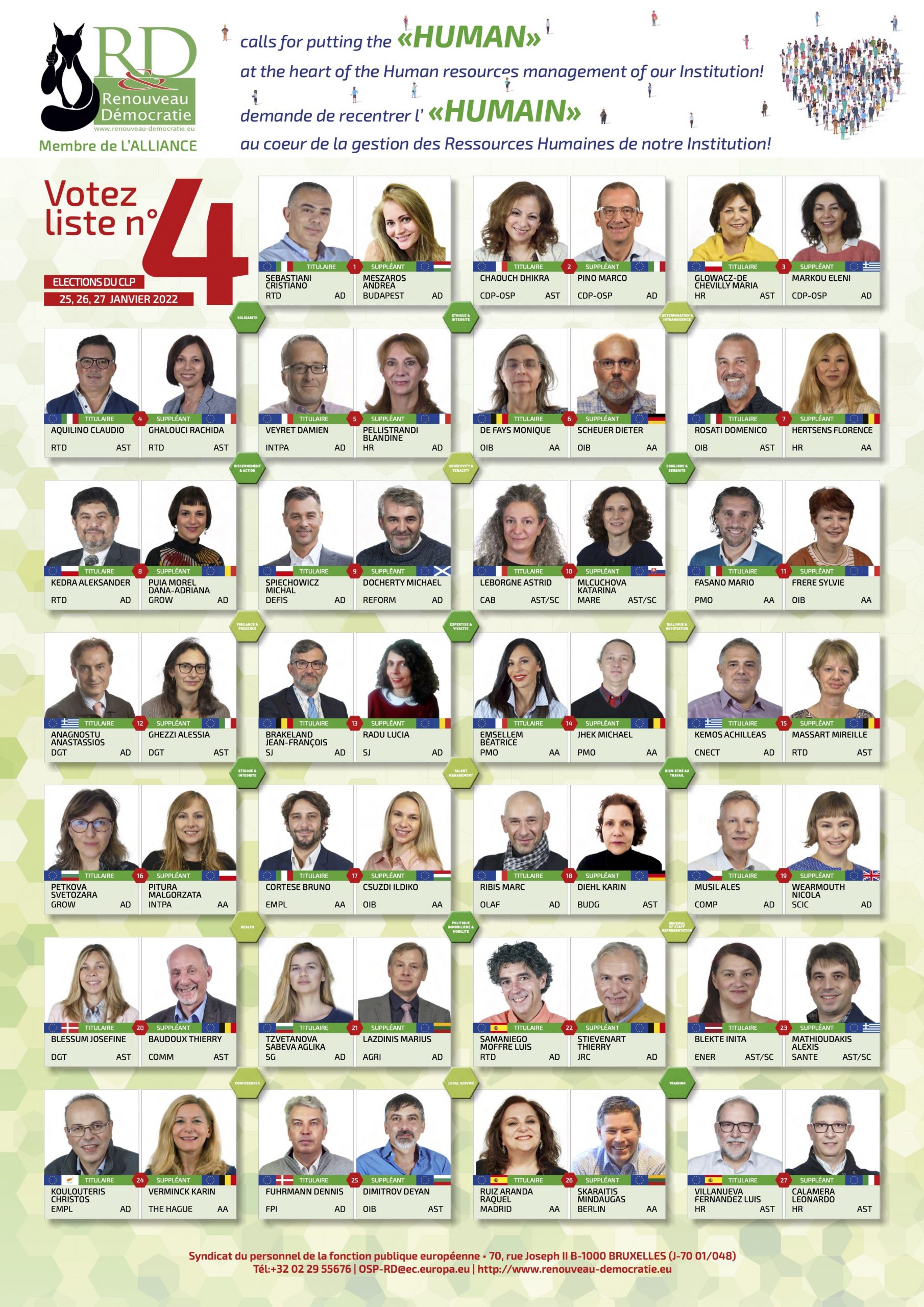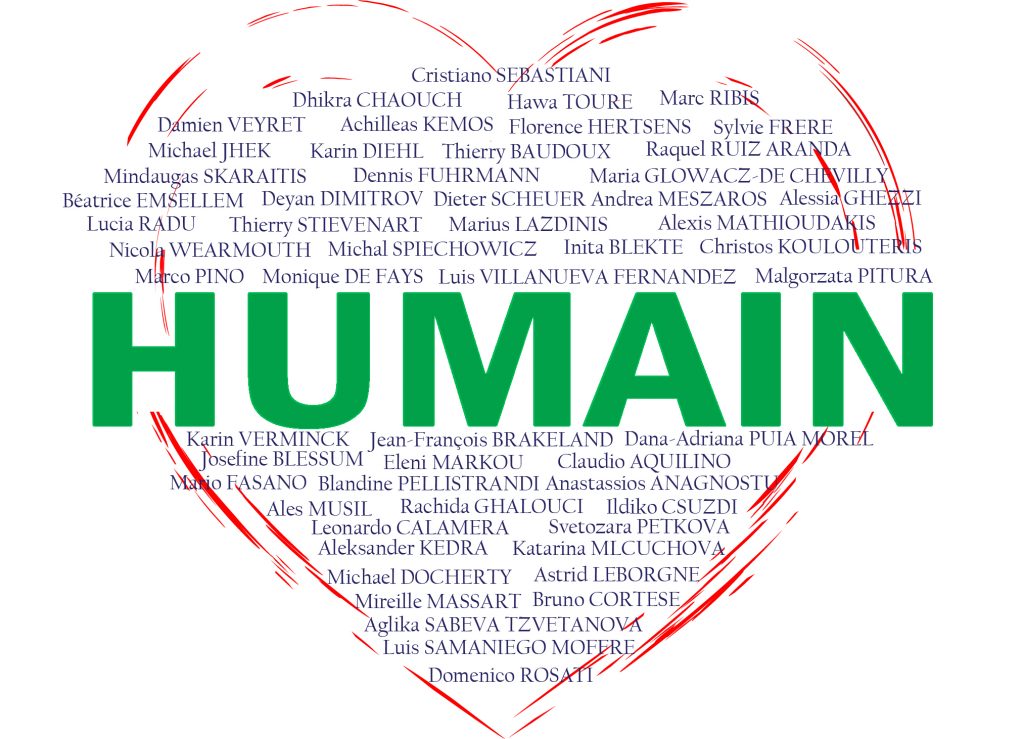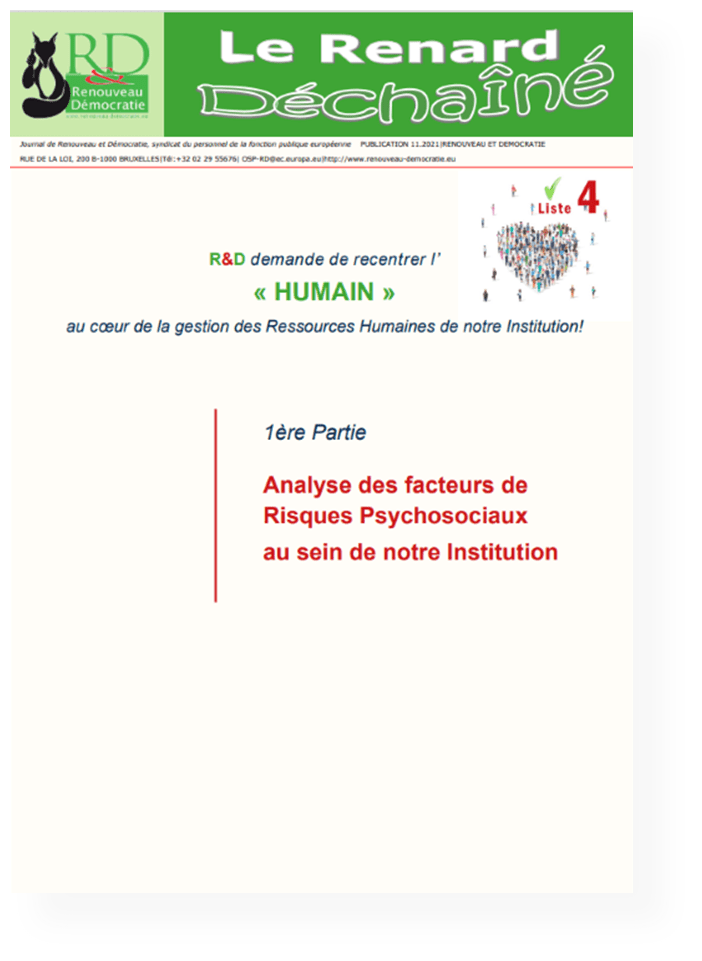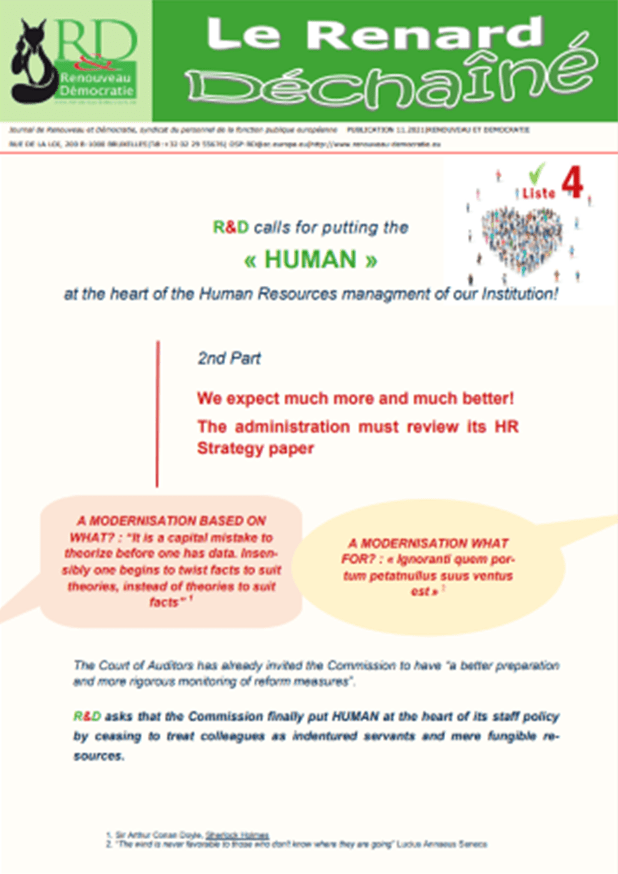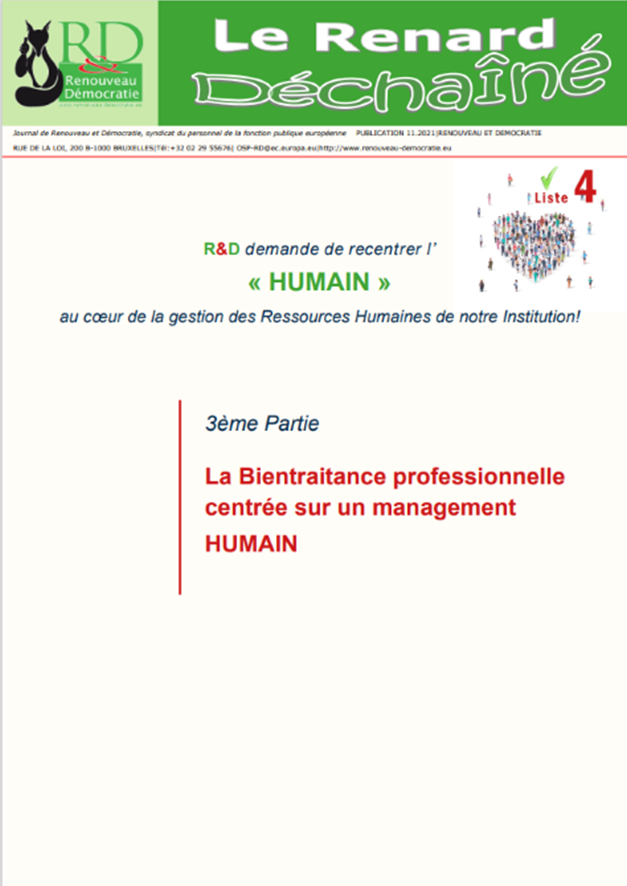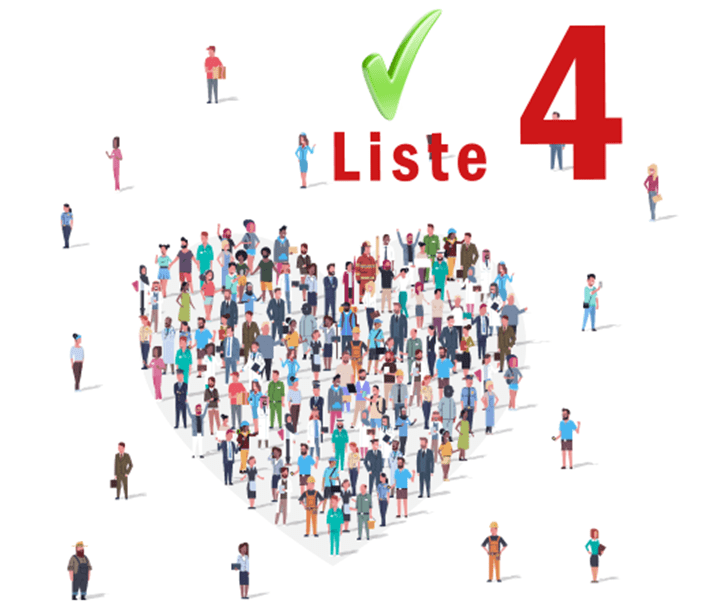
R&D calls for putting the Human at the heart of the human resources management of our institution by implementing a Quality of Life at Work policy based on solidarity, one of R&D’s core values, “Professional Caringness” and 6 key factors
Prior to any proposal for a Quality of Life at Work (QWL) approach, R&D was the first and only trade union to carry out an analysis of the Psychosocial Risk factors within our Institution (see Renard Déchaîné spécial Analysis of psychosocial risk factors in our services ), denouncing, among other things:
- Intensity and work overload resulting in a range of contracts, difficulty in reconciling work and private life, discontent among staff
- High emotional demands when staff cannot express themselves
- Value conflicts when EU values are not applied to the staff of the institution
- Low autonomy when staff have little predictability of work and no possibility of anticipation, especially when switching to hot desking
- Social relations at work showing a poor effort/reward balance, almost no career prospects, poor communication with senior management…
- Insecurity
Read our analysis in details
Some of these risk factors have increased in times of health crisis, requiring forced home working, especially the intensity and overload of work by shattering the boundaries between private and professional life. As soon as this risk emerged, R&D called for the adoption of the Right to Disconnect (see Le Renard Déchaîné spécial Droit à la déconnexion ) and called on Alex Agius Saliba, MEP, rapporteur of the decision on the recommendations to the Commission on the Right to Disconnect ( see e-conference The right to disconnect, a fundamental right to protect workers’ health ).
In addition, a part of the staff was faced with a fait accompli, in the midst of a pandemic, when hot desking was imposed on them without any prior study specific to the institution’s professions nor any consultation of the staff and their representatives. R&D called on Danièle Linhart, a work sociologist and Director of research at the CNRS… ; who spoke on « Hot-desking » and « Open Space », which workspaces at the European Commission ? » stressing the fact that « Flex desk’ and ‘clean desk’ are anxiety-provoking for employees ». Clearly, such behaviour on the part of the administration is a serious source of psychosocial risks (see Le Renard Déchaîné spécial télétravail/Hotdesking… ) especially since this was imposed by the blinkered implementation of the « New ways of working » method without the relevant services having had the decency to look into the specific functioning of our institution and to consult the staff. R&D called on Grégory Jemine, a researcher at LENTIC and an expert in this change process, to better understand the issues at stake ( see New ways of working : origins, legitimation and challenges ; The 3Bs « Bricks, Bytes, Behaviours » )
We also called upon Marie Pezé, doctor of psychology, psychoanalyst, former legal expert, head of the « Suffering and Work » consultation network, who moderated the e-conferences of the Mondays for the Prevention of Psychosocial Risks : Why does work make us sick?; PSR and QWL, what are we talking about?; Psychological harassment, what are we talking about? Pathogenic management, what are we talking about? Institutional psychological harassment… ; Burn out, what are we talking about? to better understand and deal with these emerging phenomena.
Laurent Taskin, holder of the HR lab Chair in “Human Managing” and Work Transformation at the UCL, Doctor in economic and management sciences, professor of management, researcher… discussed le Management Humain, which enabled R&D to propose the ground rules for a “Human Managing”.
For the purpose of supporting parents in this sensitive and particular period, R&D called on Bruno Humbeeck, Educational psychologist, Doctor in Education Sciences, Lecturer at the University of Mons and Head of the Educational Resource Centre for Social Action (CREAS) who presented a number of e-conferences on the following topics : Telework and children in times of pandemic, parental burnout, which pedagogies for my child ? and the prevention of cyber-harassment and school violence.
R&D has gathered the best experts to better represent and defend you and to develop its 2021-2024 work programme
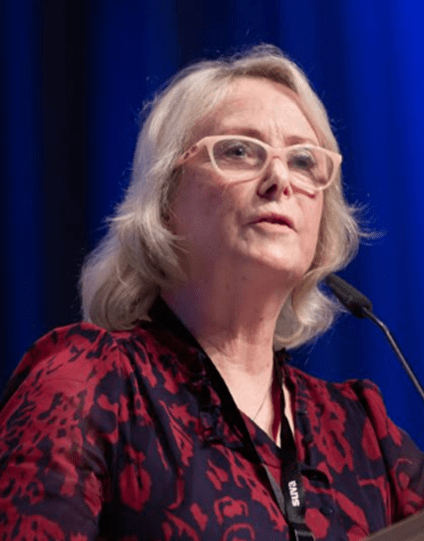
Doctor of Psychology, psychoanalyst, former judicial expert, head of the “Suffering and Work” consultation network « Souffrance et Travail »

Labour sociologist, Emeritus Research Director at the CNRS, member of the GTM-CRESPPA* laboratory, UMR-CNRS-Universities of Paris 8 and Paris 10

Holder of the HR lab Chair in Management in « Management Humain » and Work Transformation at UCL, Doctor in economic and management sciences, professor of management, researcher

Educational psychologist, Doctor in Education Sciences, Lecturer at the University of Mons and Head of the Educational Resource Centre for Social Action (CREAS)
See our e-conferences & our well-being workshops
Programme 2021-2024
1. THE HUMAN AT THE HEART OF MANAGEMENT

R&D has always called for management to lead by example and to move towards a culture of trust, which is also reflected in Commissioner Hahn’s statements. It is essential to change the managerial culture !
More
For the Human dimension to regain its place at the heart of human resources management, R&D calls for:
- Establishing a culture of trust by sweeping away management by fear
- Abolishing silos
- Introduction of hybrid working
- Training for all managers to develop trust and recognition at work
- Assessing the workload of local management to avoid overload
- Establishing organisational justice
- Fair appraisal and promotion system that takes into account effective work
- Active participation of staff in the decision-making process of the DG
- Improving communication and outreach between senior management and staff
- Fostering organisational empathy
- Empathy at the centre of strategic and managerial conversations
- Safe environment
- Collaboration through mutual support and collective action
- An ethical policy respected by all
2. CONTENT AND MEANING AT WORK

An insignificant and repetitive work content favours, in the long run, the settling of monotony and a loss of meaning in the work, both of which are elements of psychosocial risk. It is necessary to implement the meaning of work..
More
To tackle this, R&Drequires :
- Optimal use of resources and skills
- Recognition of talents within the services
- Regular feedback on work from the direct line manager
- Greater autonomy
- Professional and personal development
3. CAREER & RECOGNITION

Our mandate is well defined: we are committed to ‘staff unity’, rejecting any corporatist, competitive and divisive approach! The Commission must definitively ban social dumping!
More
R&D demands :
- Genuine career prospects with the setting up of a career plan to be discussed during the annual appraisal
- Training policy enabling the learning of new skills for career development and mobility
- R&D alongside colleagues :
- AD :
- Opening new perspectives for non-managing colleagues to access the position of senior expert
- Enabling middle management to carry out their coordination tasks
- more
- AST : A large number of AST colleagues are performing AD work, without recognition and/or reward, and there is an urgent need to offer them real career perspectives :
- Increase in the number of certifications
- Transparency and fairness in appointing team leaders, project managers and senior assistants
- Further mobility
- more
- AST/SC : providing a career path is now a must
- Increasing quotas for promotion
- Ensuring broader access to internal competitions
- Assessing the implementation of this category
- Mobility also in delegations
- more
- CA :
- Genuine career management policy including fair and transparent procedures for access to higher function groups, TA and civil servant posts
- Unlocking careers through screening of all decision-making posts
- Review of the grade range for reclassification
- Taking into account the qualification and level of responsibility for the entry grade of newly recruited CAs
- Provision of educational costs for children of departing colleagues from the institution
- more
- Representations :
- Rebalance the workload
- Adapting resources in the representations
- Involving staff in the event of a reorganisation of a representation
- Restore real equity in financial conditions
- Give true career prospects to CA colleagues
- more
- AD :
- Genuine annual internal competition policy ensuring transparency and fairness of the procedure
- Fully transparent and accessible Junior Professional programme for ASTs, AST/SCs and CAs
- Creation of a dedicated professional programme for experienced candidates
4. HEALTH & PREVENTION OF PSR
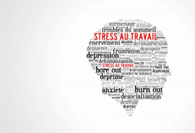
Health is a state of complete physical, mental and social well-being and not merely the absence of disease or infirmity (World Health Organisation definition).
More
Occupational health then becomes a measure to assess the well-being and working conditions of colleagues.
To precisely address this issue, R&D is calling for :
- Regulation on working time
- Fair distribution of the workload within the department according to the respective workload data, number of worked hours, intensity and complexity of the work
- Introduction of the Right to Disconnect
- Establishing an occupational risk assessment reference document for each field, which will help to prevent all work-related pathologies
- Strengthening the medical service, in particular by recruiting occupational physicians, ergonomists, psychiatrists, occupational psychologists, occupational sociologists, etc., and by upgrading nurses from AC GFII to GFIII, as is done in other institutions
- Acknowledgement of psychosocial pathologies as occupational accidents and diseases
- Development of a policy for the prevention of psychosocial risks as well as a policy for the prevention of moral and sexual harassment
- Medical examination after 4 weeks of sick leave in order to facilitate the person’s peaceful return to work
- Designing specific jobs as psychosocial risk prevention officers to assist DGs and HR in dealing with any pathogenic work organisation and to support departments in moving towards a « Human » organisation
5. WORKING ENVIRONMENT
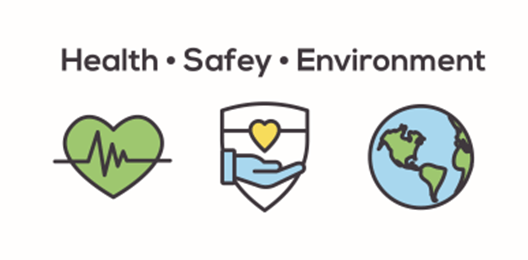
The working environment is a key element in ensuring the well-being and health of staff. This environment cannot be designed without prior study of the specific nature of the jobs and the conditions in which the work must be carried out
More
This is why, R&D firmly rejects hot desking/open space and requests :
- Establishment of a special compendium of “compatible occupations and tasks according to the workspace”, which must be complied with for any new workspace design
- Accommodation of workplaces for people with disabilities or illnesses requiring special attention
- Mandatory consultation and participation of staff in any new workspace design
- A « green » workplace
- 100% reimbursement of public transport expenses
- Catering based on a short food supply chain and favouring domestic products
6. EQUAL OPPORTUNITIES

On 19 July 2017, the Commission issued a Communication promoting an enhanced working environment for all : a strategy for diversity and inclusion (read ).
More
Without a genuine equal opportunities policy, the Commission as an employer can neither be attractive nor enable its staff to evolve. This is why, through its actions (link) R&D was already advocating for this strategy well before the Commission’s proposal
R&D calls for :
- Better work/life balance
- Promoting hybrid work by balancing telework and office presence without interference from the line manager
- Setting clear guidelines to allow telework outside the place of employment for all
- Providing a lump sum to cover the costs of telework
- Establishing a Joint Committee to ensure proper application of the rules and to prevent and sanction any inappropriate decisions
- Implementation of a diversity and anti-discrimination policy
- Recruitment policy including procedures for better organisational justice
- Communication policy to raise awareness on non-discrimination
- Specific training for managers
- Respect for cultural diversity in a multicultural environment
- Equality at work
- Enabling gender equality in all positions
- Enabling talented staff to take up management positions
- Providing easier access to employment and the workplace for people with disabilities
- Education
- European Schools
- Provision of adequate infrastructure – including mid-term and long-term building policy, especially urgent in Brussels where overcrowding is about to block admissions of Category 1 students (=children of our colleagues working in EU institutions); this also applies to classes, laboratories, IT equipment, gym facilities, etc.
- Structural inclusion of European Schools in the EU educational policies and initiatives
- Implementing a genuine educational and outreach programme, with a holistic school welfare approach, to ensure effective and professional management of the identified difficulties (see conferences: Bruno Humbeeck)
- Ensuring comprehensive special educational needs (SEN) support for children, and their families, who need much more attention including gifted students (see. com. marche ou crève)
- Support for the organisation of transport
- Childcare facilities :
- Support and collaboration with CPE Delegation
- Greater work-life balance for educational staff
- Optimum protection of educational staff in times of health crisis by valuing and recognising risk
- Recognition of the hardship of education jobs End-of-career arrangements
- European Schools
Our special files
Your candidates
